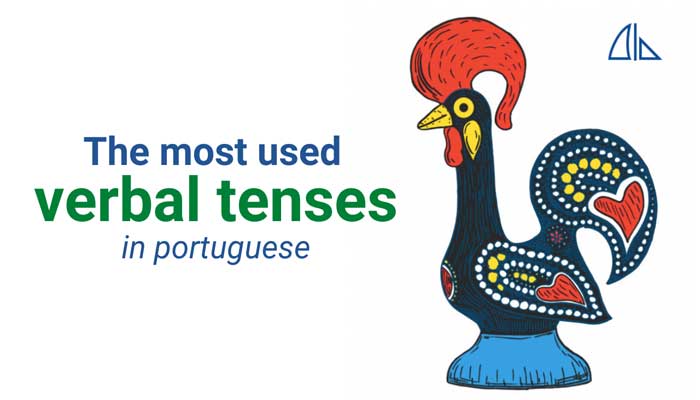The most used verbal tenses in Portuguese
Here we will talk about the four most common and useful verbal tenses. We will show why they are so useful and, the most important, in which cases we use them.

Presente do indicativo
We think you don’t need a long explanation for the Present tense. It’s important because everyone lives now and it’s used for regular actions and current facts:
Estudo português. (I study Portuguese) – regular action
Sou professor. (I’m a teacher) – current fact
We can also use the Present tense to talk about future:
Amanhã não trabalho. (Tomorrow I don’t work)
O comboio parte às 18.00. (Train departs at 6 p.m.)
Pretérito perfeito do indicativo
We use this tense to talk about RESULTS in the past. Some people think this time is used for short time actions or only for punctual actions. By the way, grammatically in Portuguese there is no short or long time: everything depends on the context. But let’s see some examples:
Ontem comi uma pizza. (Yesterday I ate a pizza)
This is punctual (it happened one time) and short in time (not takes too long to eat a pizza). But:
Ele trabalhou 10 anos nesta empresa. (He’ve been working for 10 years in this company)
This one isn’t short in time and “punctual” is also discussible. However, both tenses express RESULTS.
Pretérito Imperfeito do Indicativo
In the other hand, this form of Past expresses PROCESSES. Again, the chronological time doesn’t matter, what really matters is the action itself.
Dantes eu trabalhava num escritório. (Before I worked at the office)
We also use it for conditions and time in the past.
Eu era uma criança magra e alegre. (I was a slim and joyful kid)
Eram 3 da tarde quando ela chegou. (Was 3 p.m. when she arrived)
Formas perifrásticas
It happens when there are two verbs connected: the auxiliary verb and the main verb. The most common forms are:
– “estar” (to be) + preposition “A” + main verb → expresses present continuous
– “ir” (to go) + main verb → expresses future
Let’s see some examples.
| Eu estou a estudar. (I’m studying) | Eu vou estudar. (I’m going to study) |
| Tu estás a trabalhar. (You are working) | Tu vais trabalhar. (You are going to work) |
| Ele está a comer. (He is eating) | Ele vai comer. (He is going to eat) |
Please, notice that this form of present and the first one (Presente do Indicativo) are different. For example, “Eu estudo Português em casa” (I study Portuguese at home) means I usually do that. Although, if I say “Estou a estudar Português em casa” (I studying Portuguese at home) I mean I’m doing it right now. Sometimes we can also use this form for things we are doing currently but not necessarily right now. If I say “Estou a fazer um curso de Português” (I’m doing a Portuguese course) it means currently, because a course we do one time.
In addition, you can use this for past and future as well:
- a) Ontem eu estava a ver televisão quando chegaste. (I was watching television when you arrived)
- b) Amanhã a esta hora já vou estar a dormir. (Tomorrow at this time I will be sleeping already)
Note in sentence “a)” we say “estava a ver” and not “via” (Pretérito imperfeito). That’s because it is a process that happened one time when a punctual action happen too.
Also, these forms are very convenient for students, because it’s only necessary to know the conjugation of one verb. For example, to express future you only know the conjugation of the verb “ir” and the infinitive of the main verb.
Finally, you can use this trick with the auxiliary “costumar”. It’s a regular verb (ending in -ar) and means “usually”. With examples will be easier:
- c) Costumo ir ao ginásio de manhã = Normalmente vou ao ginásio de manhã.
(Usually I go to the gym in the morning)
“Ir” is an irregular verb, so if you forgot how to conjugate it, you can use this.
Imperativo
We use the imperative to give orders and indications, advises, suggestions and requests. Usually students don’t like the imperative in Portuguese, mainly for three reasons:
- a) Isn’t a little bit more complex than the previous forms
- b) They can use other forms (easier) instead of imperative
Examples:
Traga-me um café, por favor. (Bring me a coffee, please → imperative)
Pode trazer-me um café, por favor. (Can you bring me a coffee, please → present)
The second sentence looks even more polite, which encourage students to avoid the imperative. Although, the imperative is used by native speakers in a lot of daily life situations. Consequently, we cannot say that the imperative is so important to talk, but it’s important to understand. That’s why we must include it in our list.
Conclusion
One of the most difficult things in Portuguese language is the verbal system, because there are many verbal tenses and modes. However, if you’re starting your journey, the good news is that you don’t need to master all ones to be able to communicate with people.
If you don’t give up, you can learn all, but in order to start communicate quickly we must focus on what works better. In this case it’s what is more likely to meet in daily life.
For a deep and interesting learning, maybe you already know that you can find us in several Portuguese cities and join us online as well.
See you!
Leave a Reply